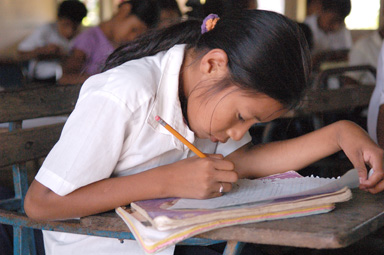Education and WASH sectors find new synergies on World Water Day
|

On World Water Day, a day on which people around the world joined together to recognize the importance of safe drinking water, adequate sanitation and hygiene education (WASH), I spent the morning thinking about the number of children who do not have access to these basic necessities at school. Therese Dooley, Senior WASH Advisor for UNICEF once said, "Currently, investment [in schools] can be quite low, and sometimes WASH in schools falls between the cracks...we just need to make sure there is funding allocated and that it does get priority."[1]
Addressing improvements to water and sanitation in schools has been elevated on the global stage in the last several years. However, more often than not, these conversations have been missing a key component: key stakeholders in the education sector. The creation of silos between WASH and education has been occurring for years due to funding. All too often grants are awarded with so many guidelines they can only be used for either improvements in WASH or for educational development, which make program collaboration difficult. There are often stipulations that educational funding can't be used to improve water and sanitation services at school.
Additionally, the WASH sector and the education sector have different approaches to the achieve the same end goals: educating youth, keeping them healthy in a safe learning environment and creating productive members of society. The approaches, although related, have tended to keep the two sectors from connecting. This separation is seen in government structures, as well. Usually the Ministry of Water is responsible for providing drinking water, sometimes the Ministry of Health is responsible for sanitation and hygiene education, and the Ministry of Education is responsible for taking care of schools. How do we break down the walls between the sectors to provide school children with a safe and healthy environment to learn?
That was the key question posed to the participants of the Education and WASH Working Group which gathered on World Water Day. CARE's Peter Lochery from the WASH sector and AED's Sergio Ramirez from the education sector both described the benefits of increased collaboration and communication to promote better learning outcomes through improved WASH services. Matt Freeman from Emory University's Center for Global Safe Water presented compelling data on the impact of improving WASH services on learning outcomes, and especially the effects of improved services on girls' learning. More detailed data can be found at www.swashplus.org.
Notably, and for the first time many of us could remember, members of the education sector made up at least half of the participants in the working group. Discussions covered the challenges of competing interests in school budget as well as the importance of the education sector to help promote sanitation and hygiene curricula in schools. These ideas were met warmly by participants from both the education and WASH sectors, and the group brainstormed areas of potential collaboration.
Participants were excited to hear of possible follow on activities such as webinars and more interactive dialogue sessions during the spring. Readers who are interested should contact Susan Dundon (susan.dundon@mwawater.org)at the Millennium Water Alliance for more information.
It was wonderful way to spend World Water Day!














